|
#551
|
||||
|
||||
مرتين وحياتك  واول مرة اتصلت عليك ونتا مرديتش فانكسفت الصراحة اكلمك تانى غير لما اكون على طريق الصحراوى تعرف مزرعة الكرام اللى قصاد البنزينة بتاعت التعاون الزرقا المزرعه فى طريق بعيد عن الطريق الصحراوى ب 20 كيلو جوا تقريبا على مدخل مدينة بدر مزرعة الكرام ومرضيتش اكلمك علشان ما أتعبكش يوم الخميس بالليل اوى كنت هناك حضرت الدرس وقعدت لبلليل وبعدين مشيت الجمعه الساعة 11 |
|
#552
|
|||
|
|||
|
[QUOTE=aimooo;702864]عاوزين يا جماعه نسأل CARS ADMIRE ايه معلوماته عن الوحش 132
اكيد عنده حاجات يعرفهالنا من مواضيعه التحفه وايه رأيه في العربيه دي وايه الخبايا اللي عنده عنها انا متأكد انه عندو موسوعة معلومات عنها 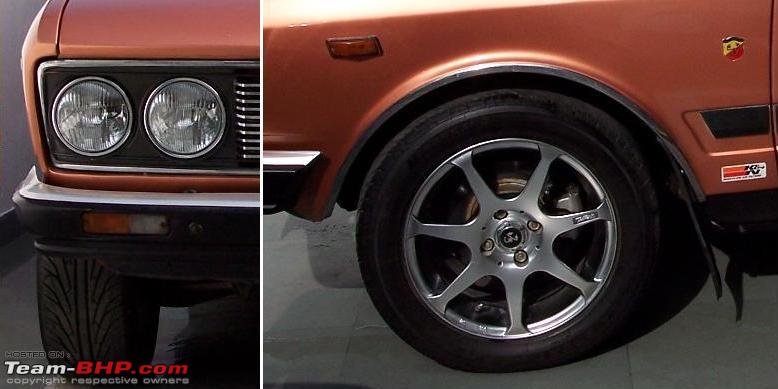 2500 سى سى ديزل  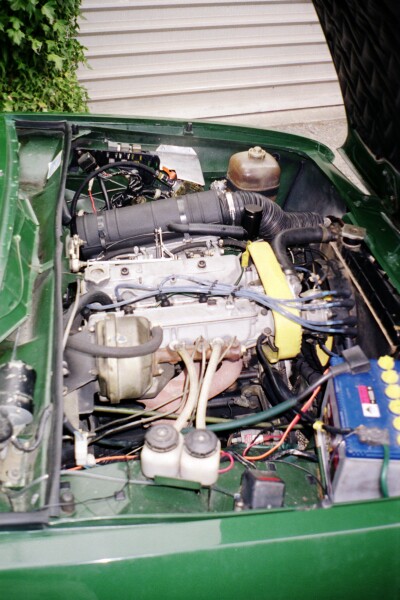 الاسبراتير فين ؟؟؟؟؟؟؟؟؟؟؟!! Notice fuel system for N2O kit installed in foreground. Holly electric fuel pump with separate regulator provides fuel at around 8 lb/in^2 to the fuel solenoid. 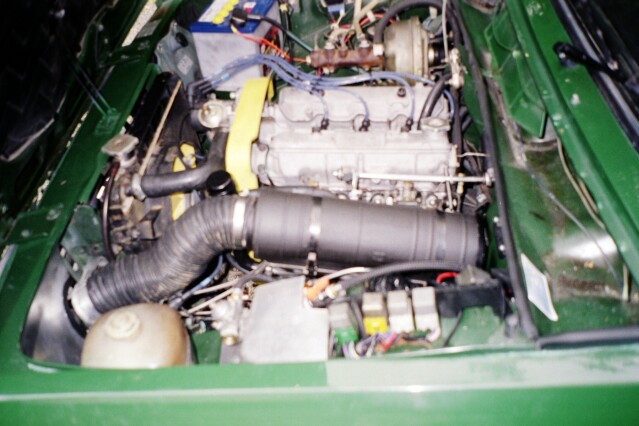 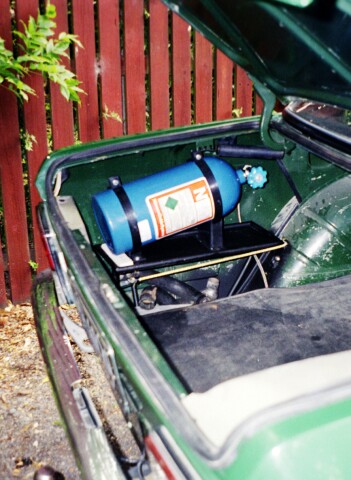 Nitrous bottle in place, but not used in the last three years. Waiting to sort out some fueling issues before this is used again. The bottle used to be inside the car behind the passenger seat. New laws meant it had to be moved to the boot. This makes turning the nitrous on and off tricky. NOS have a remote bottle solenoid, but this is another NZ$500. working on building a programmable ignition system for the car. This will let me vary the advance as I'm driving and should prove a useful tuning tool. The kit also has an input that can be used to retard the timing when the nitrous system is activated. An engine running on nitrous requires less advance than a normally aspirated engine. Fiat 132GL 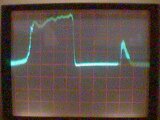 Programmable ignition Programmable ignition10 Feb 2002: Here are some photos of the kit that I have just completed. This kitset is produced by Jaycar, part number KC5202. 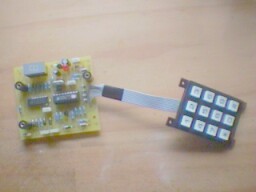 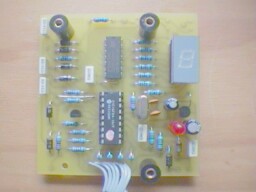 5 Jul 2002: Today I took some photos of the ignition and surrounding area. First we have some photos of the area surrounding the new ignition panel. Gear stick is from the later 5 speed gearbox, but has been chromed in place of the original black. Solid black ball gear knob is from the original 4 speed gearbox. Row of three VDO gauges provide information on N2O fuel pressure, oil pressure and oil temperature. Digital display above gauges shows cabin temperature and carb intake temperature. 5 Jul 2002: Today I took some photos of the ignition and surrounding area. First we have some photos of the area surrounding the new ignition panel. Gear stick is from the later 5 speed gearbox, but has been chromed in place of the original black. Solid black ball gear knob is from the original 4 speed gearbox. Row of three VDO gauges provide information on N2O fuel pressure, oil pressure and oil temperature. Digital display above gauges shows cabin temperature and carb intake temperature. 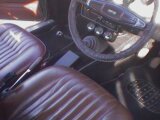 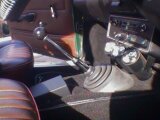 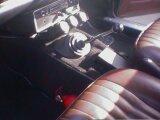 The panel opens to reveal the keypad used to program the unit, as well as the arming switch for the nitrous oxide boost system. A white LED operating off a 9V battery and triggered by a mercury tilt switch is mounted in the lid. When the lid opens, the LED comes on. Great for programming the system at night. The panel opens to reveal the keypad used to program the unit, as well as the arming switch for the nitrous oxide boost system. A white LED operating off a 9V battery and triggered by a mercury tilt switch is mounted in the lid. When the lid opens, the LED comes on. Great for programming the system at night. 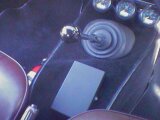 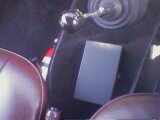 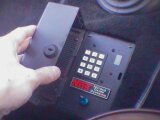  The new high energy ignition system (Jaycar kit KC5247) is mounted just behind the left headlight. The loose wires have not yet been secured down nicely. Red MSD Blaster II coil is visible in front of ignition. I took a couple more shots of the engine in general, since I had the camera out. Last photo shows fuel line for nitrous oxide system. Stop valve allows the system to be disabled. Beneath metal cover is the Holly fuel pump. Regulator for the pump is visible towards the left. Handy location of regulator makes adjusting fuel pressure a breeze. The new high energy ignition system (Jaycar kit KC5247) is mounted just behind the left headlight. The loose wires have not yet been secured down nicely. Red MSD Blaster II coil is visible in front of ignition. I took a couple more shots of the engine in general, since I had the camera out. Last photo shows fuel line for nitrous oxide system. Stop valve allows the system to be disabled. Beneath metal cover is the Holly fuel pump. Regulator for the pump is visible towards the left. Handy location of regulator makes adjusting fuel pressure a breeze. 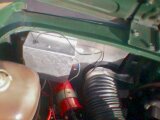 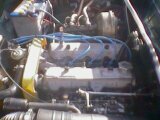 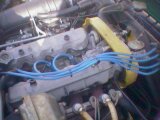 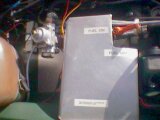 After installing the programmable ignition I started out with the advance curve for a fairly typical Fiat 2L (2ACT motor). I performed some dyno runs using the StreetDyno software. Below are the results. Note that while the absolute values reported by such software may not be accurate, the measurements are very repeatable. This makes the a tool very useful for measuring the effects (positive or negative) of changes made to the car. Note the shape of the curves. The torque curve is very broad indeed and is centred around 3500rpm or so. This gives the car good pickup when used in traffic. This can be accounted for due to the short duration high lift cams used as well as the relatively small 32mm chokes in the carbs. Torque drops off after 5000rpm, but I can live with that. After installing the programmable ignition I started out with the advance curve for a fairly typical Fiat 2L (2ACT motor). I performed some dyno runs using the StreetDyno software. Below are the results. Note that while the absolute values reported by such software may not be accurate, the measurements are very repeatable. This makes the a tool very useful for measuring the effects (positive or negative) of changes made to the car. Note the shape of the curves. The torque curve is very broad indeed and is centred around 3500rpm or so. This gives the car good pickup when used in traffic. This can be accounted for due to the short duration high lift cams used as well as the relatively small 32mm chokes in the carbs. Torque drops off after 5000rpm, but I can live with that. 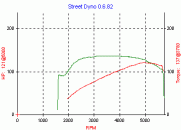 By varying the advance curve I managed to gain a few more HP at the top end. One has to exercise caution with the advance settings. Too much advance will cause detonation and may result in pre-ignition, after which your engine will only be useful as a paperweight. Note that both of these curves are for the engine running in normally asperated mode. As yet I haven't performed a dyno run with the nitrous kit operational. By varying the advance curve I managed to gain a few more HP at the top end. One has to exercise caution with the advance settings. Too much advance will cause detonation and may result in pre-ignition, after which your engine will only be useful as a paperweight. Note that both of these curves are for the engine running in normally asperated mode. As yet I haven't performed a dyno run with the nitrous kit operational. 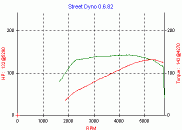 With the programmable high energy ignition system installed the car drives much better than before. It is particularly noticable when the car is cold. It doesn't stumble, cough and splutter as it used to. The car feels much better throughout the rev range too. I can now drive around town at 2000rpm if I so desire. This would have been quite difficult with the old ignition system! In addition, the hesitation that I experienced previously when driving at 80-100kph has almost entirely disappeared. There is a slight flat spot that can still be felt, but it's almost not worth chasing, though I probably will. With the programmable high energy ignition system installed the car drives much better than before. It is particularly noticable when the car is cold. It doesn't stumble, cough and splutter as it used to. The car feels much better throughout the rev range too. I can now drive around town at 2000rpm if I so desire. This would have been quite difficult with the old ignition system! In addition, the hesitation that I experienced previously when driving at 80-100kph has almost entirely disappeared. There is a slight flat spot that can still be felt, but it's almost not worth chasing, though I probably will. 8 Jul 2002: Took my N2O cylinder to BOC gasses today to have it re-certified. They are sending it off to Auckland. In order to re-certify it they need to test such things as the safety valve. If it doesn't pass, they can repair/replace the valve etc. The legislation has recently changed and before it can be re-certified however they must first assign it a LAB number. The thing is, they also test it before assigning a LAB number, and if it fails that test they cannot give it a LAB number. Well I just hope it doesn't get stuck in an infinite loop of not being able to be fixed because it's not certified, etc. etc! 12 Jul 2002: I picked up my custom built vacuum actuated switch today. This will connect to the ignition system and provide further advance when the engine is operating under light load. The unit was built by Barry Emms of Quality Rebuilds. Barry engineered the unit to make it possible to adjust the activation point by simply rotating a nylon knob.  25 Jul 2002: I just heard back from BOC gasses regarding my nitrous oxide cylinder. It turns out they no longer re-certify the automotive variety. They tried to locate companies that do, but couldn't find anyone! Help! Does anyone know of a place that re-certifies automotive nitrous oxide cylinders in New Zealand? Stay tuned for the latest news on the Fiat from hell. Fiat 132GL  Air/fuel meter kit Air/fuel meter kit12 Jul 2002: This is a kitset that I have built to install in the Fiat. The Jaycar catalogue number is KC5300. The kit allows you to measure the air:fuel ratio of your engine. I'm going to use it to track down the flat spot in the throttle response when cruising. I think the car might be running slightly lean. As standard the kitset comes calibrated for a Bosch sensor. After completing the kit I went to buy the sensor. Well it turns out there is more to a sensor than one might first imagine. There are standard (EGO) sensors that are good for measuring around the 14.7:1 ratio. These do not work well with particularly rich or lean mixtures. For such mixtures it is better to use what is known as a wide-band (UEGO) sensor. They exhibit a transfer curve that produces a more accurate result when measuing particularly rich or lean mixtures. The particular sensor this kit is calibrated for is a wide-band sensor. Now the scarey part. The Bosh sensor retails for around NZ$730 (~US$350). This is around ten times the price of the kitset itself. With this in mind I put off buying a sensor at all. I hooked up a variable voltage display to the input of the kit and took some photos (below). This lets you see the typical values you might see on a working unit. Everything from rich (R) through to Lean (L). 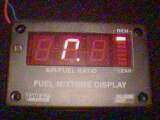 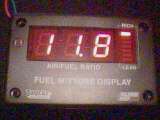 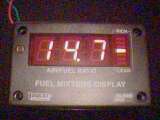 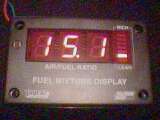 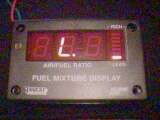 I have been fluffing around and performing a lot of research on the web and locally. The more I look the worse it appears to get. At best, people grab any old sensor, hook it up to a volt meter (preferably digital because of the high impedance of such a meter) and use this with great success in tuning their car. Hooray. At worst, it appears that the sensors are quite variable beasts, and things such as temperature have a major effect on the voltage a sensor will produce. Unless you can measure what temperature your sensor is running at in some dynamic way, your measurements when in the rich area could be a long way off. I have been fluffing around and performing a lot of research on the web and locally. The more I look the worse it appears to get. At best, people grab any old sensor, hook it up to a volt meter (preferably digital because of the high impedance of such a meter) and use this with great success in tuning their car. Hooray. At worst, it appears that the sensors are quite variable beasts, and things such as temperature have a major effect on the voltage a sensor will produce. Unless you can measure what temperature your sensor is running at in some dynamic way, your measurements when in the rich area could be a long way off. OK, I've decided to go with a typical garden variety EGO sensor and to see how it goes. I saw that people on the Net were paying around US$30 for them, so I decided to go to the local parts shop and just buy a new unit. OK, NZ$142 (US$70) later I have a brand new generic single wire EGO sensor. So much for obtaining a cheap sensor. Still it's better than $700+. I decided to take a photo of this wonderful piece of equipment (below).  The next stage is to have the sensor fitted to the car in a suitable location. The next stage is to have the sensor fitted to the car in a suitable location. Fiat 132GL  Distributorless ignition, version 1 Distributorless ignition, version 1The year is 2005. Funny, car technology really hasn't advanced much in the last few years. The Fiat has been running pretty well, but the distributor has been giving some problems. The hack to attach the distributor to the end of one of the cams has resulted in a bit of play. With the amount of play in the system this has lead to quite a bit of wear. In fact when I disassembled it, there was a nice slot carved out by the metal pins on the distributor shaft. I had been thinking about distributor-less ignition for a while as I had never really liked this distributor much. It came off a Japanese car and the module in it also let me down once (stranded on side of road...). I decided to design and build a distributor-less system; a so-called wasted spark design. This works with two coils, each coil providing two outputs, to two spark plugs. When one coil fires, two cylinders 'fire', but the timing is such that one of those cylinders will be on the exhaust stroke and hence will have no effect (the spark is effectively wasted). I figured I would be able to build this into the Jaycar programmable system so that I would be able to still use that to perform the timing, and my bit of kit would select which coil to charge and fire. التعديل الأخير تم بواسطة cars admire ; 26-06-2012 الساعة 01:49 PM |
|
#553
|
|||
|
|||
|
Here is version 1 of the system.
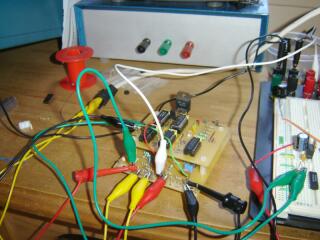 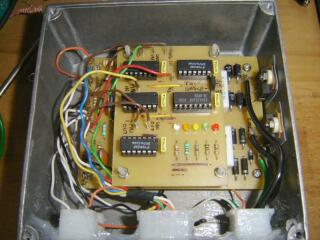 Needless to say it didn't work. Needless to say it didn't work. Being stubborn I didn't give up and buy a Toyota. Instead I built version two. Distributorless ignition, version 2 After some serious thought I decided it would not be reasonable to use discrete ICs to design the ignition. There were just too many things I was not sure about with regard to the Jaycar ignition. What signals were produced, when, level-triggered vs. edge triggered, it was all a bit foggy. So I decided to use a microcontroller. This would let me fiddle with somftware and not have to design new boards each time. It's based on an Atmel chip which I had to order from Digikey in the US - they don't seem to sell them in this unfashionable end of the world. 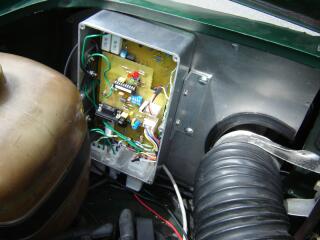 As you can see it's housed in a die-cast box where the old ignition used to be. You can just make out the 20 pin Atmel chip and a D9 connector. Yes, my car has a serial interface... As you can see it's housed in a die-cast box where the old ignition used to be. You can just make out the 20 pin Atmel chip and a D9 connector. Yes, my car has a serial interface... In order to decide which bank of cylinders should fire I use a cam sensor. This was mounted in front of one of the cam wheels. Tim at Fixations helped with the mounting of the sensor as well as fitting 'timing marks' onto the cam wheel itself. The timing for these does not have to be exact as I only need to know what 'quadrant' I need to be in. The sensor is just visible in the photo below (right hand cam wheel). 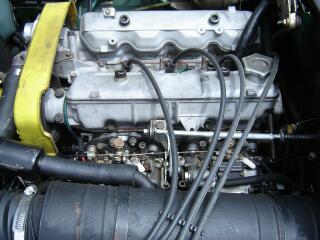 The two coils I used are from a model of Holden which is pretty common in this part of the world. As it turned out, the low voltage connectors on the coil are very close to, but entirely different to any sort of commonly available connector. It's a female connector so there's no easy way to fudge something. I went to Holden to enquire about the mating part, but of course it costs $600. It turns out it's more than a connector; it includes electronics too. Gee wizz, that's just great. Staring at the coil for a while I decided to fabricate a connector. Hanna helped, and cutting and filing at small pieces of brass for some time we had some really nice mating connectors. The two coils I used are from a model of Holden which is pretty common in this part of the world. As it turned out, the low voltage connectors on the coil are very close to, but entirely different to any sort of commonly available connector. It's a female connector so there's no easy way to fudge something. I went to Holden to enquire about the mating part, but of course it costs $600. It turns out it's more than a connector; it includes electronics too. Gee wizz, that's just great. Staring at the coil for a while I decided to fabricate a connector. Hanna helped, and cutting and filing at small pieces of brass for some time we had some really nice mating connectors. 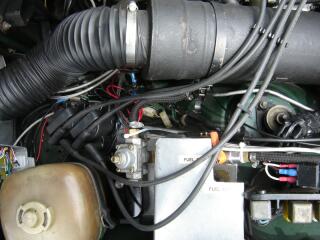 All hardware installed I set about writing the software. Some experimentation was required in order to get the system running. It's amazing how many parameters there are for such a simple system. Also, it's amazing how loud it can be when an air/fuel mixture explodes at the wrong time (say in your exhaust) when you are testing in the garage. After much spluttering, coughing, head-scratching and thought I finally reverse-engineered the Jaycar system enough to figure out what I needed. A few versions of code later (presently the car runs MartinOS V1.03) it burst into life. Yippee! All hardware installed I set about writing the software. Some experimentation was required in order to get the system running. It's amazing how many parameters there are for such a simple system. Also, it's amazing how loud it can be when an air/fuel mixture explodes at the wrong time (say in your exhaust) when you are testing in the garage. After much spluttering, coughing, head-scratching and thought I finally reverse-engineered the Jaycar system enough to figure out what I needed. A few versions of code later (presently the car runs MartinOS V1.03) it burst into life. Yippee! It ran pretty well for the next few months. A nice professional PCB is in the works to replace the hand-made in the garage at home one I have been using. Then bad things happened  ![Fun 36 1 7[1]](images/smilies/fun_36_1_7[1].gif) Where is all the water going?  After changing to the distributor-less system the car was pretty reliable. The only thing I noticed in the following months was that it would consume spark plugs a little more regularly than it used to. Number four always appeared a little discoloured. See the photos below; left is a plug from number one. Right is a plug from number four. 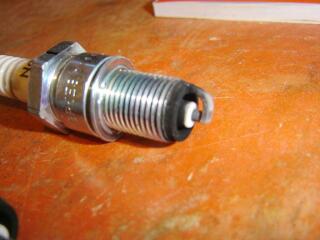 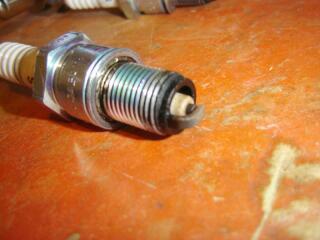 I had changed a stage hotter in plugs in an appempt to prevent this fouling. It kind of worked, but not very well. The car kept consuming plugs. The plugs above are NGK BP5ES from memory. I had changed a stage hotter in plugs in an appempt to prevent this fouling. It kind of worked, but not very well. The car kept consuming plugs. The plugs above are NGK BP5ES from memory. For what it's worth, many people with older cars have problems with the current fuel in New Zealand. It causes fouling quite badly so it is quite common to run slightly hotter plugs than in a country where decent fuel is available. After some time without any body repairs that dreaded rust started to appear. So I took the car in for work. I'm amazed how a new car gets repaired in a day or two, but as soon as the car is old, the panel-beater gives it lower priority. Anyway, after being passed over for a few weeks, the car is finally ready. So I'm driving home and the temperature rises above where it usually sits. I stop and check the water level in the radiator. Oh no, there is no water... This reminds me of another story (there are so many) about a colleague of mine who had his car worked on. When he picked up the car he noticed that the temperature went up higher than normal. He stopped to have a look under the hood and noticed the radiator was missing. Yes, the garage had removed it and not replaced it. Good 'ol NZ eh. My car still had its radiator, just no water. So had the water been drained or had it disappeared by another means? Well, in the days that followed I kept a close eye on the water level. It appeared to be disappearing. Oh no, head gasket? The oil looked fine though. Of course this happens when your mechanic takes a three month leave to go to Europe. So it's off to another mechanic, in fact the guys who service my 911. As it turns out they pressurise the system and water blasts out number four spark plug hole. Oh dear. They remove the head and find a leak between the water jacket and the inlet of number four. Number four. That explains it. Looking at the rather clean valve on number four it's possible to see I've been running with water injection (unintended in this case). 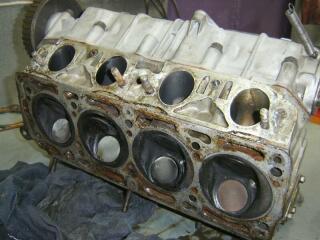 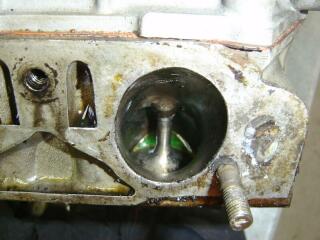 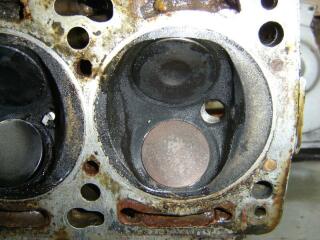 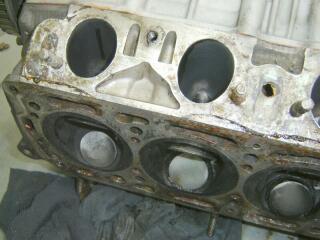 Since the leak is in a low-pressure section I decide to have it welded up. The head will then be skimmed to make sure it's flat again. All the Abarth gasket bits (130TC) and new bolts are ready. Just have to wait on the engineering shop now. Since the leak is in a low-pressure section I decide to have it welded up. The head will then be skimmed to make sure it's flat again. All the Abarth gasket bits (130TC) and new bolts are ready. Just have to wait on the engineering shop now. I took some photos of the car without its head. It really does look poorly. 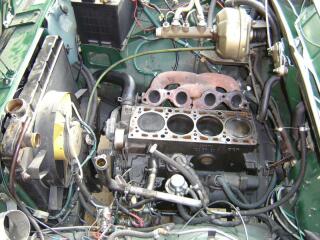 While the head is off awaiting work I decide to have hardened valve seats installed. There is a bit of a story behind this. A few years ago the government stopped the sale of leaded petrol in New Zealand. This of course was a bad thing for classic cars that rely on the lead for lubrication. As a band-aid, most garages started selling a fuel additive called Valvemaster. This is added to the fuel tank each time you fill up. It's a hassle of course to do this. The price of Valvemaster has also been rising steadily. I've paid NZ$2 (about 1 Euro) per Valvemaster at some garages. One shot does 20L of fuel. The alternative is to replace the exhaust valve seats with hardened versions that mean the car can run on unleaded fuel without any additive. Less hassle that's for sure. Since the head is off the car it makes sense to do it now. While the head is off awaiting work I decide to have hardened valve seats installed. There is a bit of a story behind this. A few years ago the government stopped the sale of leaded petrol in New Zealand. This of course was a bad thing for classic cars that rely on the lead for lubrication. As a band-aid, most garages started selling a fuel additive called Valvemaster. This is added to the fuel tank each time you fill up. It's a hassle of course to do this. The price of Valvemaster has also been rising steadily. I've paid NZ$2 (about 1 Euro) per Valvemaster at some garages. One shot does 20L of fuel. The alternative is to replace the exhaust valve seats with hardened versions that mean the car can run on unleaded fuel without any additive. Less hassle that's for sure. Since the head is off the car it makes sense to do it now. Here is a photo of the carbs as they lie on the bench at Autothority. 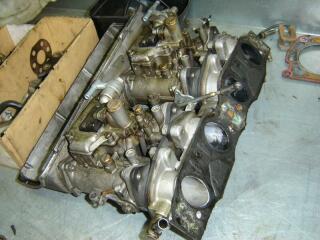 We're about to start week five since the car was taken in. I'm trying to remember what it was like to drive. I think first gear is left and forward...? We're about to start week five since the car was taken in. I'm trying to remember what it was like to drive. I think first gear is left and forward...? هدية لمسترهشام الجزار علشان ينفز ويطبق!!! وعلشان استاز ايمن واستاز محمد صلاح القاضى !!  رابط مهم جدا http://www.google.com.eg/url?sa=t&rct=j&q=131%20ab arth%20volumetrico&source =video&cd=7&ved=0CEoQtwIw Bg&url=http%3A%2F%2Fplay. kendincos.com%2F174578%2F Wpttxdhrvnrjntxjn-motor-131-abarth-16v-gr4.html&ei=HI7pT-XwNIHWsgbd4p3GDg&usg=AFQj CNGVfI2-l05x4bEnLOP2gKkb029Bjg موتور مين ده ؟؟؟؟؟؟!! |
|
#554
|
||||
|
||||
|
__________________
 استفسر عن دهان سيارتك !!! اللهم لك الحمد كما ينبغي لجلال وجهك وعظيم سلطانك ورشة إيه آي أوتو بينت لسمكرة ودهان السيارات
|
|
#555
|
|||
|
|||
![Fun 36 1 39[1]](images/smilies/fun_36_1_39[1].gif) ![Fun 36 1 39[1]](images/smilies/fun_36_1_39[1].gif) ![Fun 36 1 39[1]](images/smilies/fun_36_1_39[1].gif) ![Fun 36 1 39[1]](images/smilies/fun_36_1_39[1].gif) ![Fun 36 1 39[1]](images/smilies/fun_36_1_39[1].gif) ![Fun 36 1 39[1]](images/smilies/fun_36_1_39[1].gif) ![Fun 36 1 39[1]](images/smilies/fun_36_1_39[1].gif) ![W6w200504111340266d8924c1a[1]](images/smilies/w6w200504111340266d8924c1a[1].gif) :w6w 200504111340266d:w6w20050 4111340266d:w6w2005041113 40266d :w6w 200504111340266d:w6w20050 4111340266d:w6w2005041113 40266d
|
 |
| الكلمات الدليلية |
| 132, fiat |
|
|